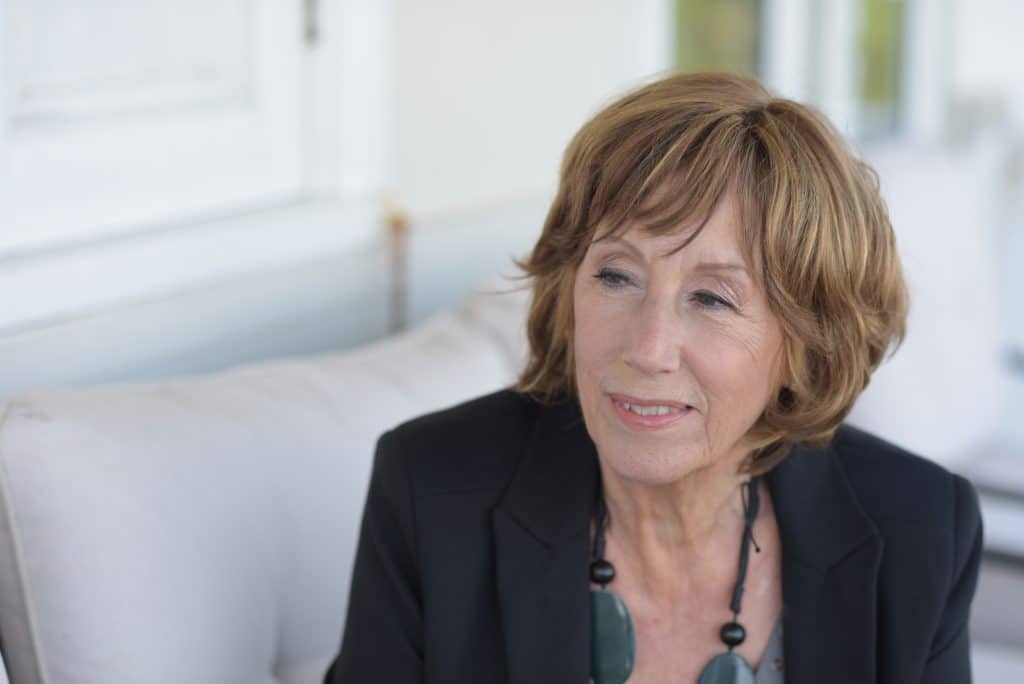Norma Winstone is a British vocalist and lyricist whose work spans more than fifty years. Her collaborators on stage and on recordings have included Kenny Wheeler, John Taylor, Nikki Iles, Fred Hersch and, more recently, Kit Downes and Glauco Venier. An ECM recording artist, Norma is equally superb whether writing and delivering her own lyrics or navigating a song wordlessly with a modernity that is singular. She lives in England and has two sons, Leo (51) and Alex (49), with her ex-husband, pianist John Taylor. She is also a grandmother to Leo’s two teenage daughters.
UKJN: When you thought about becoming a parent, did you want or seek out advice or did you just dive in?
NW: No, I didn’t seek out advice. I mean, you’re going to get advice if you’ve got a mother that lives anywhere near you! You’re going to get some kind of advice, aren’t you? My mum used to help sometimes to look after Leo and Alex, which is a great thing if you have any parents nearby that want to do it, even if sometimes there’d be a little criticism about something. But she didn’t ever say, “I think you should do this.” I was doing what I did and she knew there was no way I was going to stop working and stop singing. I was married to John Taylor and we never ever discussed how we were going to work out the balance of the division of labour. If I was working, he just took over and took over cooking and washing nappies (or as we used to do in those days-it was just before all the disposables came in). He was great and I didn’t really think about it at that time.
It was just the beginning of the women’s lib movement and Leo was born in 1973. I was often asked in interviews, “Do you feel you’ve been sidelined by other musicians?” That wasn’t anything to do with being a parent, they were just asking if, as a woman in jazz, I’d ever felt excluded. Really, I never did and all I could say to them was, “No I’ve always been helped, actually, by musicians.” Of course most of the musicians were male. If you were a woman in jazz, you were generally a singer but of course that has changed now (I’m pleased to say). I couldn’t really say I was discriminated against ever and if I had thought that I was, it would be because I was a singer and not a woman. Generally it’s that feeling that jazz musicians don’t particularly want to accompany singers. They think of it as accompanying as opposed to a joint effort in making music.I I always came across as if I must have been a contented housewife or something because I really didn’t have anything to complain about.
UK Jazz News: Did you plan to have a family or know you wanted to be a mother?
Norma Winstone: It was not a thing that I ever craved. At the time, I just thought, I don’t know if I can have them and there wasn’t a great desire to have a child but it happened. I thought, “Oh, I can have them.” I had one and I thought I better have another one to keep the other first one company and it happened to be two boys, which was good in a way. Two and a bit years apart is also a good age gap.
UKJN: Before Leo arrived, maybe when you were pregnant, did you worry at all about your career and professional ambitions and how they may change with parenthood?
NW: Maybe I did, but it didn’t really worry me that much. I never intended not to sing. I never intended to give up and, in fact, I worked up until both my boys were born. Especially with Alex. He was born on the 16th of May and I remember doing a gig where I stood most of the time
on the 2nd of May and then I did a session after that, about a week before he was born. Of course with breastfeeding it was all a little bit of a problem afterwards because if you start doing too much work then your milk dries up or you go off and then you suddenly realise that you’ve got wet patches on your blouse when you should be feeding them! These are just sort of practical things really but, no, I didn’t really worry. I really don’t cross bridges too much before I come to them. I think we’ll sort that out when we come to it.
UKJN: It’s a good attitude to have-why worry about something that may or may not come to fruition down the line? And it sounds like you and John had this really beautiful kind of dance and rhythm throughout early parenthood.
NW: Yes, and sometimes we were working together too. In fact, we had a couple of tours when they were a bit older where we took them with us. I think Alex was two and Leo was four and we had a tour with Azimuth. My mother was going to have them for a couple of weeks and I suddenly said to John, “I can’t do it. I can’t leave them for two weeks. I don’t think it’s good.” And he said, “Well, we’ll have to take them with us then.”
We were driving in Europe, and we had Kenny (Wheeler) and Kenny’s wife, Dorreen. Dear Dorreen, a wonderful woman, used to help us with the kids. She loved children, luckily, so she’d have them. They’d come to the soundchecks and then she’d put them to bed. A couple of times, we were working opposite John Abercrombie and Ralph Towner. They were on last and we were on first so I’d manage to run back to the hotel and take over from Dorreen so she could come out. The kids loved it. We took them twice, at ages two and four, and then at four and six. After that, it wasn’t really possible because of school. They used to say, “When are we going on tour again?!” They loved the different elevators and toilets. It was great for them.
UKJN: That leads me to my next question. How was having them on tour for you?
NW: It’s harder work, of course, having them with you but I don’t know how it was for me…I didn’t really ever particularly feel comfortable if they were there, off stage or even in the audience while we were performing because it’s distracting. Whereas if they’re being taken care of in the hotel, then I could forget about that and just think about what I was doing. I wouldn’t particularly have wanted them running about and sometimes it was like that at sound checks.
I remember seeing Jeanne Lee once singing and suddenly this child walked onto the stage. It was obviously her child and she bent down and she picked it up and was holding it while carrying on singing. I thought, “I don’t know if i could do that in a concert.” It was lovely in a way but I just thought I’m not sure I could do that. So having kids on tour is one thing but then having them around when you’re actually doing the performance is another.
UKJN: In hindsight, is there anything that you wish you had been told that you weren’t told about parenthood?
NW: I don’t think so-I just did it. There was a time when I was doing a gig and I had Alex in a carry cot and I took him across to the pub in the interval! One just dealt with it, really. I mean, I just hoped that they didn’t suffer. I didn’t really like leaving them.
UKJN: So how did you navigate when they were school age and they had to be in school and you were aware of them needing their rhythm and routine?
NW: Well, I don’t know whether I deliberately changed things, but things happened where I started to be offered session work, studio work, which was great, really, because it meant that I wasn’t going away quite so much, although I still did go away when I was offered work. But obviously I would have thought about it if I was offered anything lengthy.
UKJN: If someone came to you today and said, “Oh, Norma, I would really like to have children, but I also really want to work and be a musician. Do you have any advice for me?” What would you say?
NW: Well, I wouldn’t see why they couldn’t do both. But I’d have to know a lot about their life to know how they could organise it.- it depends on if they’ve got a partner or a husband and how helpful they are potentially. It depends how desperate you are to have a child.
UKJN: Or how desperate you are to have a career!
NW: Well, yes! It’s funny. I don’t think I was desperate to have children. But I was glad that it happened. And I wouldn’t have changed it, of course. And I suppose I was desperate to have a career. I don’t think of it as a career. I just think of it as what I wanted to do, you know, singing. I didn’t have a plan, a career path to follow. I seem to have sort of stumbled from one thing to another. And meeting musicians, the right musicians, as it turned out, interesting musicians that developed what I did and made me perhaps more involved than I would otherwise have been. I never really thought of it as a career. It’s silly, isn’t it?
UKJN: You’re very consistent, Norma. Because when I first met you and had tea with you, over ten years ago, you had the same outlook, which I found very inspiring and also very liberating. This sense of not overthinking, letting singing and opportunity happen organically. I think that’s such a nice way to move through something that can be so angst-creating.
NW: Yeah, I just feel lucky, very lucky. But, I mean, if things had gone differently, then I’d have probably reacted differently. I’d have done different things.
UKJN: Did becoming a mother affect you as a musician or change how you engage with music?
NW: Well, it must have done. I think you become, perhaps, more intelligent. You’re in touch with your emotions. You change through the various experiences that you have anyway, not only having children, but other experiences through your life. They must, as a singer, affect your voice and your interpretation of songs. And in my case, the writing of lyrics.
I mean, it’s such a profound thing. I can remember seeing Leo’s face the first time, how beautiful it was. And how aware you are, after giving birth, of this little thing that they give you.
Everything that happens to you, affects you emotionally. And parenthood is one of the big things in your life that, I think, must affect your singing. It’s got to. And your thoughts about everything.
Norma’s new duo album with pianist Kit Downes, “Outpost of Dreams,” is out on ECM Records on Friday 5 July 2024.
(*) Mothers in Jazz was started by vocalist Nicky Schrire. The initiative aims to create an online resource for working jazz musicians with children, those contemplating parenthood, and jazz industry figures who work with and hire musicians who are parents. The insight of the musicians interviewed for this series provides valuable emotional, philosophical and logistical information and support that is easily accessible to all. “Mothers In Jazz” shines a light on the very specific role of being both a mother and a performing jazz musician.


